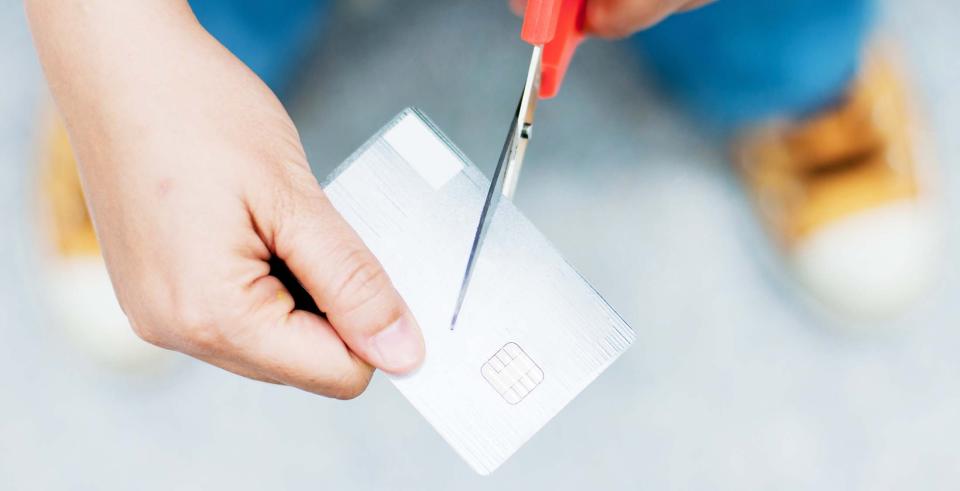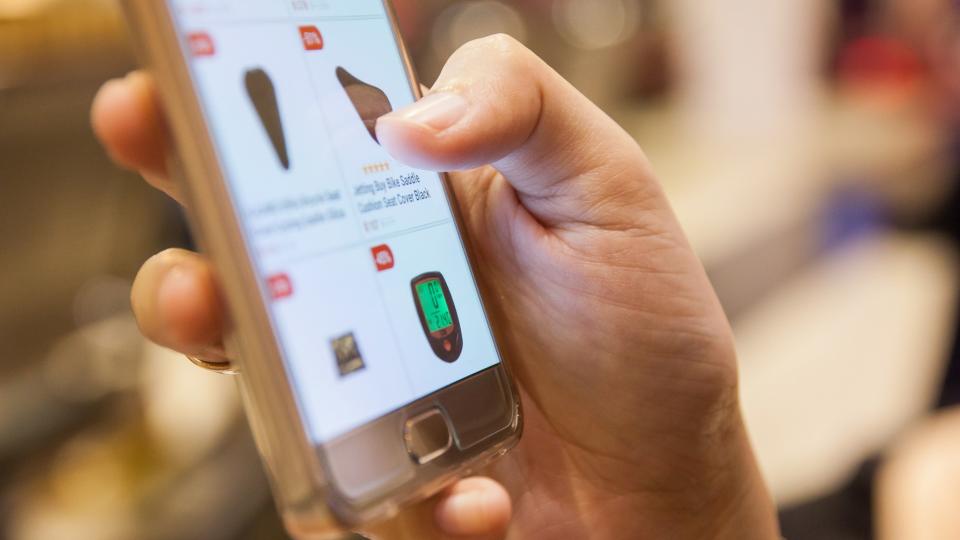10 Reasons Why Your Credit Score Goes Down
If you don't have much -- or any -- experience with credit at this stage of your life, you may wonder why people worry if their credit scores go down. Put simply, without a good credit score, your ability to get credit at an affordable rate will likely be severely limited. "Creditors want to lend money to people who they believe are likely to repay their loans so that they can keep on making money -- not losing theirs," said Matthew Jimenez, CEO of My Credit Repair Clinic. "So lenders use your credit score as a reference when deciding whether someone can get a loan, and what interest rate should be charged on that loan."
Small Business Love: Don't Miss Out on Nominating Your Favorite Small Business To Be Featured on GOBankingRates -- Ends May 31
Your credit score is made up of a variety of factors that are weighted according to the credit scoring model being used. The most common credit-scoring model to date is FICO, created by the Fair Isaac Corporation, which is used by over 90% of top lenders.
And while most people know that irresponsible use of credit can cause your credit score to dip or even plummet, bad credit behavior isn't the only reason your score might go south.
"FICO scores can drop for a number of reasons -- even when you're in great financial health and do a good job of managing your cash flow well," said Eric Roberge, CFP and founder of Beyond Your Hammock. "This surprises a lot of our financial planning clients who make above-average incomes and may not even have any consumer debt to their names."
Here are 10 reasons why your credit score could go down -- some through no fault of your own.
Last updated: May 21, 2021

Poor Payment History
"One of the main things that can have a severe impact is your payment history," said Stephen Weyman, co-founder of creditcardGenius. "Lenders typically provide ratings for borrowers to the credit bureaus depending on whether their payments are made on time. Making late payments to your credit card or missing out on them completely will also be reported to the credit bureaus. These records often remain in your credit file for seven years and can negatively impact your score, which, in turn, can prevent you from qualifying for loans or low-interest rates as you're seen more as a risk to the lender."
Read: 10 Credit Score Myths You Need To Stop Believing

Hard Credit Inquiries
"When people are looking to secure a loan, open a credit card, consolidate debt or get financing on a car or other major purchase, this will almost always require a hard credit inquiry, which can cause your credit score to go down," said Carter Seuthe, CEO, Credit Summit. "People often don't realize the difference between a hard and a soft credit inquiry, and less-scrupulous companies will hide this information in fine print."
According to Experian, hard inquiries can reduce your credit score by five points or less. The better your credit is, the less impact this type of inquiry will have. And your score should rebound within a few months. However, if you apply for several different loans or credit cards within a short period of time, your score could drop 15 points or more.
See: 90-Second Moves To Raise Your Credit Score 200 Points

Closing a Credit Card
While you may never use a credit card -- or maybe you paid it off and don't want to use it because of unfavorable terms -- closing that account is one of those things that can mess up your credit score.
"Closing a credit card can also impact your score," said Ann Martin, director of operations of CreditDonkey. "When you close a card, you shorten the total amount of your credit limit, which affects your utilization ratio. FICO counts credit history as 15% of your score."
Check Out: This Easy Trick Will Improve Your Credit Score and Avoid Late Payments

Having Too Many Open Lines of Credit
You may be tempted at some point to open various accounts, but it could hurt your credit score for more than one reason.
"If you open up multiple new accounts, not only is that a hard inquiry that will hurt your score each time, it's also decreasing the average age of your open lines of credit," said Daniel Rodriguez, director of operations at Hill Wealth Strategies. "The most favorable ratings go to people that have an average age of credit history at nine or more years, while an average age of less than four years typically has a negative impact."
More: 10 Things to Do Now If You Have a 500 Credit Score

Credit Utilization
"One of the biggest reasons for a credit score drop is credit utilization," said Roberge. "If you use more than 30% of your available credit all at once, this can cause your score to drop (sometimes significantly). For example, say you have a $10,000 credit limit. If you make a $7,500 purchase, that takes up 75% of your available credit, and you may see your score drop after that purchase posts. It doesn't matter if you have the cash available to pay for your purchase or pay off the card on time and in full and therefore don't actually incur any debt or owe interest. It can still negatively impact your score simply because you used up a large amount of your available credit."
But Roberge says the damage is not permanent.
"The good news is that your credit score should eventually recover, but for the most part, you want to monitor how much of your available credit you use at any one time and keep that usage to 30% or less of your total credit limit," he said.
Learn: Paying in Full vs. Partial Payments: Which Is Best for Your Credit Score?

You Fail To Use Your Account
"If you leave an account inactive for over a year, and in some cases less time than that, the lender will send you a beautiful letter saying 'thank you for your business; we appreciate it, but we already decided to close your account due to inactivity,''' said Adrean J. Rudie, a professional of 30 years in finance, mortgage, real estate and book author. "This drops your score without your consent."
"But you've also got to use those accounts," she said. "Nobody likes being ignored. Set it up on your calendar twice a year, or at the very minimum once a year to charge something small on the card even if you're not going to use it long-term. Basically, babysit the account and buy something small and pay it right off on the next billing cycle. This will trip the computer to show activity and continue on."
See: Will Opening a Checking Account Hurt Your Credit Score?

A Lender Closes Your Account Due To Factors Out of Your Control
"Sometimes lenders do an internal risk assessment and will just arbitrarily go through and close people's accounts," said Rudie."This will also make you appear heavier leveraged and drop your FICO credit score. Try to keep your overall balance against all your credit lines at 30% or below. Obviously, make sure you're making your payment on time."
Case in point: In 2020, approximately 70 million people -- over one-third of credit cardholders -- had their credit limit reduced or their credit card account closed between mid-May and mid-July, according to a Lending Tree Survey. The most common reasons for reductions or closures, according to the survey, include credit score decreases, inactivity and missed payments.
Find Out: Here’s How Much Debt Americans Will Have Due To the Coronavirus, by State

Foreclosures, Bankruptcy and Past-Due Child Support
"These are extreme examples, but they have the greatest impact on a credit score," Rodriguez said. "Foreclosures can drop your credit score by as much as 160 points alone and stay on your report for seven years. Bankruptcy can stay on your record for up to 10 years and can drop your score by more than 200 points in some cases. Past-due child support can also drop your score by more than 100 points and stay on your credit report for up to seven years. Basically, when circumstances get to this point, it means that payments have been missed for so long that they have already hurt your credit score along the way and been referred to a collection agency to try and retrieve the debt. By the time a collection agency gets involved, a lot of damage has already been done at that point."
More: 25 Ways To Save Yourself From Your Debt Disaster

Car Repossessions and Short Sales
"Car repos report as a collection, which decreases your score as well," said Vanessa Perry of Impeccable Credit Services. "A short sale on your home will always report as a settled-for-less-than-the-amount foreclosure. Contrary to popular belief, a short sale is still reported as a foreclosure. Many realtors will say that it will help your credit, but it does not; it only hurts your credit."
Read: What Not To Do While Trying To Get Out of Debt

Errors on Your Credit Report
"Errors on your credit report can be another quick way to drop your score," said Tony Wahl, director of operations at Credit Sesame. "If you see any incorrect marks on your report, be sure to dispute them with the credit bureaus as quickly as possible. When you take the time to understand what affects your credit score, you're taking the first steps toward having better control over your finances."
Here's how you can get a free credit report so you can stay on top of what's going on with your credit.
See: Reasons You’re Still Living Paycheck to Paycheck

What You Need To Know About Improving Your Credit Score
"The impact on scores of any given change will differ depending on the individual's unique credit history and the credit scoring system being used, " said Rod Griffin, Experian's senior director of consumer education and advocacy. "The combination of factors and the person's credit history affect how many points a score may decrease and how long it will take to recover. The risk factors provided with the credit score you receive are essential to understanding what most affected the number based on your unique credit history. The risk factors describe what, from your personal credit history, most affected the score. They are typically listed in order of importance. Focus on those risk factors to take steps to improve your scores over time. They tell you exactly what you need to work on."
More from GOBankingRates
Money’s Most Influential: Where Do Americans Get Their Financial Advice?
‘Rich Dad Poor Dad’ Author Robert Kiyosaki: You Should Never Say ‘I Can’t Afford That’
Here’s How Much You Should Have in Your 401(k) Account, Based on Your Age
This article originally appeared on GOBankingRates.com: 10 Reasons Why Your Credit Score Goes Down

